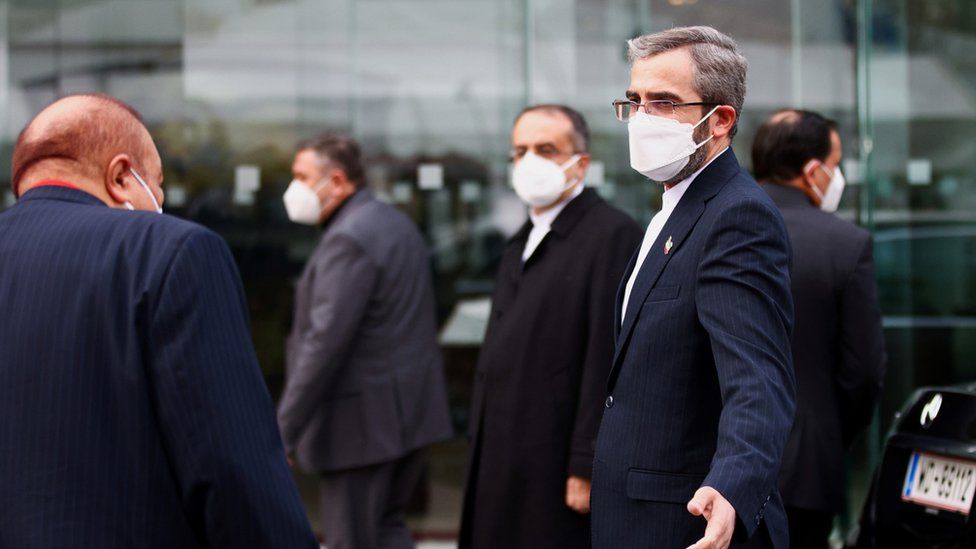Showing posts with label Nuclear Deal. Show all posts
Showing posts with label Nuclear Deal. Show all posts
Thursday, February 10
The Iran Nuclear Deal
Tehran, Iran – Representatives of Iran and world powers will reconvene in Vienna to try to salvage the 2015 nuclear deal whose fate is set to affect the region and beyond.
Political delegations from Iran, China, Russia, France, Germany, the United Kingdom and the United States are expected back in the Austrian capital on Tuesday to engage in the final stretch of negotiations that began in April last year.
Iran and the US are not engaging in direct talks since the latter’s withdrawal from the deal in 2018 that followed imposing harsh sanctions that are still in place.
The two sides have bridged some gaps since the start of the eighth round of talks in November last year but differences remain, especially on what sanctions the US must lift.
Iran wants all sanctions imposed by the administration of former US President Donald Trump lifted, while the Joe Biden administration has said it is prepared to lift those “inconsistent” with the deal.
The Joint Comprehensive Plan of Action (JCPOA), as the deal is formally known, provided sanctions relief for Iran in exchange for curbs on its nuclear programme.
A year after Trump started imposing sanctions, Iran gradually grew its nuclear efforts and is now employing advanced centrifuges to enrich uranium up to 60 percent while maintaining it will never use it to make weapons. READ MORE...
Wednesday, December 1
Iran Nuclear Deal
 IMAGE SOURCE,REUTERSImage caption,
IMAGE SOURCE,REUTERSImage caption,Iran's chief negotiator Ali Bagheri Kani says the West "needs to pay a price" for its actions
Critical talks with Iran to prevent the collapse of a nuclear deal have resumed in Vienna after a five-month pause.
Officials are discussing the possible return of the US to the 2015 accord, which limited Iran's nuclear activities in return for the lifting of sanctions.
Iran has violated key commitments since then-President Donald Trump pulled out in 2018 and reinstated US sanctions.
Joe Biden is willing to lift them if Iran reverses the breaches. But Iran wants the US to make the first move.
Western diplomats have warned that time is running out to negotiate a solution because of the significant advances Iran has made in its uranium enrichment programme, which is a possible pathway to a nuclear bomb.
Iran insists that its nuclear programme is entirely peaceful.
ANALYSIS: Could Iran talks succeed?
ANALYSIS: Threat of Israeli strike on Iran nuclear sites grows
BACKGROUND: Iran nuclear deal: What it all means
Diplomats from Iran and the five countries still party to what is known formally as the Joint Comprehensive Plan of Action (JCPOA) - China, France, Germany, Russia and the UK - met at a hotel in the Austrian capital on Monday afternoon, with US representatives participating indirectly. READ MORE...
Friday, February 12
IRAN: Tehran's Nuclear Deal
According to Aljazeera:
Iran’s foreign ministry has rejected any new negotiations or changes to the participants of Tehran’s nuclear deal with world powers, after French President Emmanuel Macron said any new talks should include Saudi Arabia.
“The nuclear accord is a multilateral international agreement ratified by UN Security Council Resolution 2231, which is non-negotiable and parties to it are clear and unchangeable,” Iranian Foreign Ministry spokesman Saeed Khatibzadeh was quoted by state media as saying on Saturday.
Iran began breaching the deal’s limits on uranium enrichment activity after Washington withdrew from the pact in 2018 under then-President Donald Trump and re-imposed economic sanctions on Tehran.
President Joe Biden’s new administration has said it will rejoin the deal but only after Tehran resumes full compliance with its terms.
But Iran has rejected US demands to reverse its acceleration of the nuclear program before Washington lifts sanctions on Tehran.
Saudi Arabia and its ally the United Arab Emirates have said that Gulf Arab states should be involved this time in any talks, which they say should also address Iran’s ballistic missile program and its support for proxies around the Middle East.
Saudi Arabia, which is locked in several proxy wars in the region with Tehran including in Yemen, supported Trump’s “maximum pressure” campaign against Iran.
Iran’s foreign ministry has rejected any new negotiations or changes to the participants of Tehran’s nuclear deal with world powers, after French President Emmanuel Macron said any new talks should include Saudi Arabia.
“The nuclear accord is a multilateral international agreement ratified by UN Security Council Resolution 2231, which is non-negotiable and parties to it are clear and unchangeable,” Iranian Foreign Ministry spokesman Saeed Khatibzadeh was quoted by state media as saying on Saturday.
President Joe Biden’s new administration has said it will rejoin the deal but only after Tehran resumes full compliance with its terms.
But Iran has rejected US demands to reverse its acceleration of the nuclear program before Washington lifts sanctions on Tehran.
Saudi Arabia and its ally the United Arab Emirates have said that Gulf Arab states should be involved this time in any talks, which they say should also address Iran’s ballistic missile program and its support for proxies around the Middle East.
Saudi Arabia, which is locked in several proxy wars in the region with Tehran including in Yemen, supported Trump’s “maximum pressure” campaign against Iran.
Subscribe to:
Comments (Atom)

